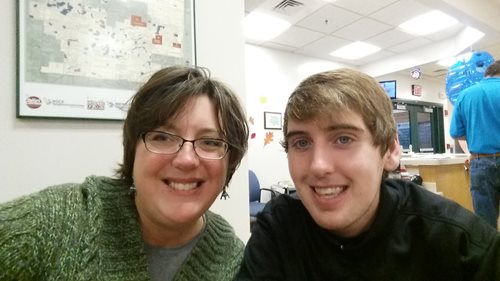March 08, 2017
By Happy Carlock
For most parents raising a toddler, age 3 is a year of celebrating developmental milestones. This is usually the age when most kids learn to say their name, distinguish between colors and express affection for family members and friends.
For Jenifer Walsh, though, it was also the age when she first saw signs of her son Ryan’s mental health condition. “I could tell he had some unusual anger issues,” she said. “As he got older, he started drawing violent pictures and became moody and paranoid. He would have horrible meltdowns where I’d have to do therapeutic holds.”
 Jenifer is a 45-year-old mother of four living in Illinois. Her son Ryan is now 19 and lives with schizophrenia. He has a steady job and regularly sees a psychiatrist. And if it wasn’t for Medicaid, Ryan might not be alive today.
Jenifer is a 45-year-old mother of four living in Illinois. Her son Ryan is now 19 and lives with schizophrenia. He has a steady job and regularly sees a psychiatrist. And if it wasn’t for Medicaid, Ryan might not be alive today.
Ryan’s journey with mental illness and accessing care has been long and difficult. Shortly after he started high school, Ryan had a psychotic break, attempted suicide, and spent 42 days in a mental hospital. “If Ryan had not been on Medicaid, his stay in the mental health hospital would have been two weeks and no more,” Jenifer said.
“He was so psychotic that if he had not had access to medications or had not been treated in the mental health hospital, I’m fully convinced he would have attempted suicide again and possibly completed it,” Jenifer said.
Jenifer is only one of many mothers across the U.S. living in fear that her child’s access to mental health insurance is under threat. Today, no one can be denied health insurance coverage because they have a mental health condition, thanks to safeguards in the Affordable Care Act. Mental health services funded by Medicaid truly mean the difference between life and death.
Mental health services and supports funded by Medicaid are under serious threat as Congress considers restructuring Medicaid financing. Proposed changes to the Medicaid program would result in deep funding cuts over the next few years. If changes like per capita caps or Medicaid block granting pass, people like Ryan would likely face waitlists for mental health services, reduced hours of services, fewer providers and less intensive mental health services.
Medicaid has been a life-saver for millions of Americans—including all four of Jenifer’s children. Her husband is self-employed in construction, a field that took a determinantal hit in in 2009. “We lost our house in 2010, we had basically no income, and we had to move in with family, which allowed all of our children to get onto Medicaid,” Jenifer said.
There was about an 8-month gap when her family had no coverage because her husband’s company lost its group insurance policy. Their insurance provider at the time denied Ryan insurance because of his pre-existing conditions. “The only access we had would have been a high-risk insurance policy which would have been $3,000 a month,” Jenifer explains. We can’t go back to that.
So, now it’s our turn to speak up so Americans like Ryan can get the access to care that they need in times of complete hopelessness—so moms like Jenifer can watch their children grow up and become role models to their younger siblings.
Congress just unveiled the American Health Care Act, which ends the requirement that Medicaid expansion plans cover mental health care. It caps Medicaid funding and will freeze Medicaid expansion, putting young people who are first experiencing serious mental illness at risk.
Tell your U.S. Representative this is unacceptable.
Call (202) 224-3121, press #2 and enter your zip code.
For more information, including examples of talking points, click here.
Happy Carlock is advocacy & public policy coordinator at NAMI.
We’re always accepting submissions to the NAMI Blog! We feature the latest research, stories of recovery, ways to end stigma and strategies for living well with mental illness. Most importantly: We feature your voices.
LEARN MORENAMI HelpLine is available M-F, 10 a.m. – 10 p.m. ET. Call 800-950-6264,
text “helpline” to 62640, or chat online. In a crisis, call or text 988 (24/7).